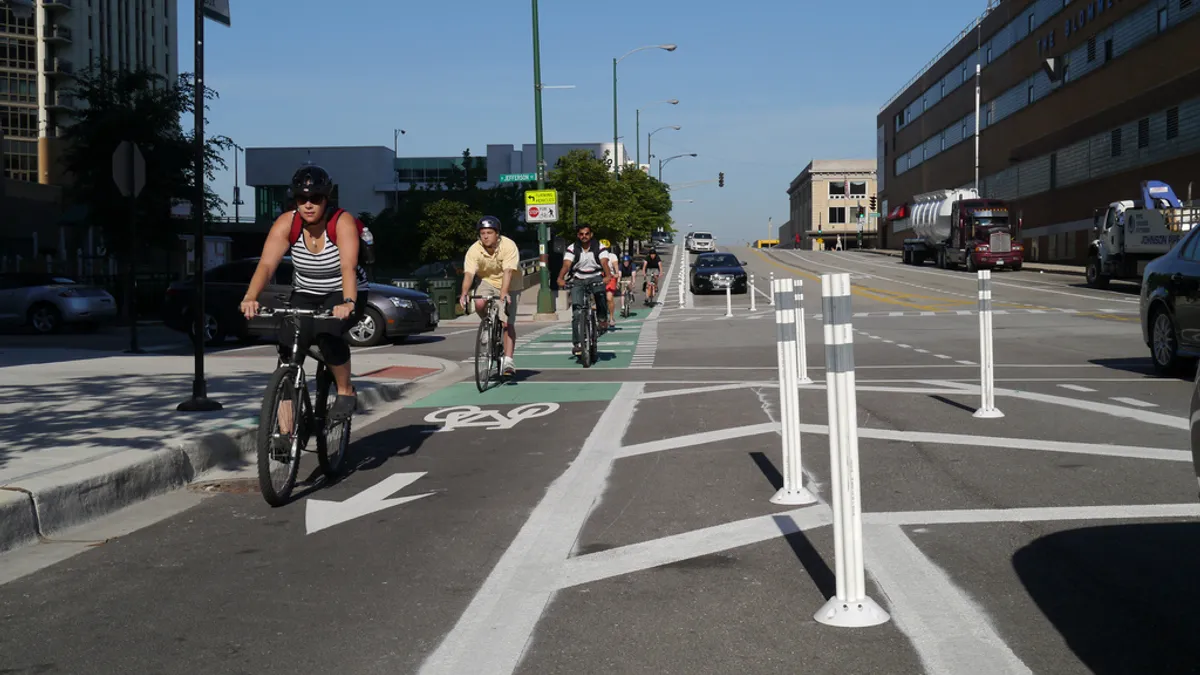Dive Brief:
- Reps. Earl Blumenauer, D-OR, Ayanna Pressley, D-MA, and Vernon Buchanan, R-FL, reintroduced two pieces of legislation last week designed to fund nationwide bike-share programs and expand commuter benefits for bicyclists.
- The Bikeshare Transit Act would make local bike-share programs eligible for federal transportation funding and define them as a mode of transit in federal law — guaranteeing the mode an established source of financial support from the government. Currently, the U.S. Department of Transportation (USDOT) uses its discretion on whether to provide funding for bike-share programs.
- The trio of lawmakers also reintroduced the Bicycle Commuter Act, which would reinstate and modify the bicycle commuter tax benefit. It would make the benefit pre-tax, like for parking and transit, and clarify that bike-share and electric bike-share options are eligible, among other provisions. The benefit was repealed in 2017 under the Tax Cuts and Jobs Act through 2025, but a prior version of the bill passed the House in July as part of the Moving Forward Act, alongside a prior version of the Bikeshare Transit Act.
Dive Insight:
The coronavirus pandemic has brought a massive surge in cycling across the world as socially distanced residents look for ways to exercise and get around, especially with transit service cut back in many cases to the bare minimum. And it helped make an impact as cities saw reduced emissions as many people stopped commuting or getting around by car. Blumenauer said it represents a new opportunity for lawmakers, especially once the pandemic is over.
"Even when the pandemic ends, this demand for biking will remain," Blumenauer said in a statement. "The federal government needs to catch up and finally provide the funding, flexibility, and incentives needed to strengthen bike culture and infrastructure."
For bike-share systems, the legislation could be a particular boon. Blumenauer's office noted the explosive growth of the use of bike-share, although some cities have seen their systems flounder due to financial issues. For example, Denver was forced to shutter its BCycle program, but donated its bikes to its counterpart in Houston, saving the latter thousands of dollars in fleet acquisition costs.
Getting bike-share codified as a mode of transit could be crucial for funding purposes, said Caron Whitaker, vice president of government relations for the League of American Bicyclists. She said federal funding up to this point has only been usable for docking stations and not for the bikes themselves, as transit funding cannot be spent on any single-occupancy vehicle. Having bike-share defined in federal law as a mode of transit could also enable dockless systems to be eligible for federal funding, Whitaker said.
Other advocacy groups said funding bike-share should be part of a broader effort to think differently about how to finance transportation projects and move beyond a reliance on highways.
"For too long, federal transportation policy has pumped billions into programs that fail to achieve the outcomes Americans want: namely, getting where you need to go affordably, safely, and conveniently," Transportation for America spokesperson Jenna Fortunati said in an email. "Legislation like the Bikeshare Transit Act starts the work of connecting policy to this fundamental goal by making bikeshare systems eligible for federal funding, especially bikeshare facilities near transit stations."
Indeed, the League of American Bicyclists said there is evidence that public opinion has shifted in favor of more federal funding for bicycling and walking. In research released last September, the group found that 60% favor that funding shift, with that support cutting across demographic and ideological lines.
The Bicycle Commuter Act's use of incentives at the federal level could have a real impact on people's commutes, Whitaker said, especially as it works in concert with parking and transit incentives and could be used for bike-share and e-bikes as well as traditional pedal power.
"Especially after the pandemic where we've seen a lot of transit service or certain stops cut, now you could bike to your bus or bike to your train and then take transit the rest of the way," Whitaker said.
But Whitaker warned that the polling did not yet show a "COVID bump," which would indicate a longer-term shift in people’s transportation habits towards bicycling as a way to get around regularly, not just for leisure. She said more outreach and education is needed so people can integrate cycling into their lives post-pandemic.
"I don't think that means these new and returning bicyclists can't become supporters or advocates for more funding or won't start riding more for transportation once they have more places to go, it just means our work as advocates is just beginning," Whitaker said. "I also think it means that advocates should not assume everyone is with us right away. Doing so could even backfire."












